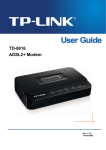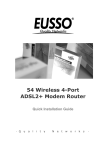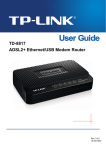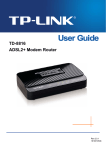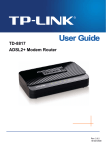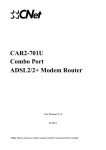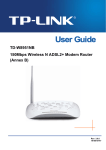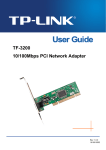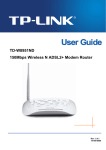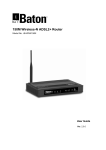Download TP-LINK TD-8616 modems
Transcript
TD-8616 ADSL2+ Modem Rev: 2.0.0 1910010591 COPYRIGHT & TRADEMARKS Specifications are subject to change without notice. is a registered trademark of TP-LINK TECHNOLOGIES CO., LTD. Other brands and product names are trademarks or registered trademarks of their respective holders. No part of the specifications may be reproduced in any form or by any means or used to make any derivative such as translation, transformation, or adaptation without permission from TP-LINK TECHNOLOGIES CO., LTD. Copyright © 2012 TP-LINK TECHNOLOGIES CO., LTD. All rights reserved. http://www.tp-link.com FCC STATEMENT This equipment has been tested and found to comply with the limits for a Class B digital device, pursuant to part 15 of the FCC Rules. These limits are designed to provide reasonable protection against harmful interference in a residential installation. This equipment generates, uses and can radiate radio frequency energy and, if not installed and used in accordance with the instructions, may cause harmful interference to radio communications. However, there is no guarantee that interference will not occur in a particular installation. If this equipment does cause harmful interference to radio or television reception, which can be determined by turning the equipment off and on, the user is encouraged to try to correct the interference by one or more of the following measures: • • • Reorient or relocate the receiving antenna. Increase the separation between the equipment and receiver. Connect the equipment into an outlet on a circuit different from that to which the receiver is connected. • Consult the dealer or an experienced radio/ TV technician for help. This device complies with part 15 of the FCC Rules. Operation is subject to the following two conditions: 1) 2) This device may not cause harmful interference. This device must accept any interference received, including interference that may cause undesired operation. Any changes or modifications not expressly approved by the party responsible for compliance could void the user’s authority to operate the equipment. CE Mark Warning This is a class B product. In a domestic environment, this product may cause radio interference, in which case the user may be required to take adequate measures. DECLARATION OF CONFORMITY For the following equipment: Product Description: ADSL2+ Modem Model No.: TD-8616 Trademark: TP-LINK We declare under our own responsibility that the above products satisfy all the technical regulations applicable to the product within the scope of Council Directives: Directives 2004 / 108 / EC, Directives 2006 / 95 / EC, Directives 2011/65/EU The above product is in conformity with the following standards or other normative documents: EN 55022:2006+A1:2007 EN 55024:1998+A1:2001+A2:2003 EN 61000-3-2:2006+A1:2009+A2:2009 EN 61000-3-3:2008 EN 60950-1:2006+A11:2009+A1:2010 The product carries the CE Mark Person is responsible for marking this declaration: Yang Hongliang Product Manager of International Business Date of issue: 2012 TP-LINK TECHNOLOGIES CO., LTD. Building 24 (floors 1, 3, 4, 5), and 28 (floors 1-4) Central Science and Technology Park, Shennan Rd, Nanshan, Shenzhen, China CONTENTS Package Contents .................................................................................................... 1 Chapter 1. Introduction ........................................................................................ 2 1.1 Product Overview ...................................................................................................... 2 1.2 Main Features ........................................................................................................... 2 1.3 Conventions .............................................................................................................. 2 Chapter 2. Hardware Installation ......................................................................... 3 2.1 The Front Panel ........................................................................................................ 3 2.2 The Back Panel......................................................................................................... 4 2.3 Installation Environment ............................................................................................ 4 2.4 Connecting the Modem ............................................................................................. 4 Chapter 3. Quick Installation Guide .................................................................... 6 3.1 Configure PC............................................................................................................. 6 3.2 Login ......................................................................................................................... 9 Chapter 4. 4.1 4.2 4.3 Software Configuration.................................................................... 11 Statistics .................................................................................................................. 11 4.1.1 Device Information .........................................................................................................11 4.1.2 Traffic Statistics ..............................................................................................................12 Basic Setup ............................................................................................................. 13 4.2.1 WAN Setting...................................................................................................................13 4.2.2 LAN Setting ....................................................................................................................15 4.2.3 ADSL ..............................................................................................................................16 Maintenance............................................................................................................ 16 4.3.1 Administration.................................................................................................................16 4.3.2 Firmware.........................................................................................................................17 4.3.3 SysRestart......................................................................................................................18 4.3.4 Diagnostic Test...............................................................................................................18 Appendix A: Specifications................................................................................... 19 Appendix B: Troubleshooting............................................................................... 20 TD-8616 ADSL2+ Modem User Guide Package Contents The following items should be found in your package: ¾ One TD-8616 ADSL2+ Modem ¾ One Power Adapter for TD-8616 ADSL2+ Modem ¾ Quick Installation Guide ¾ ¾ ¾ One RJ45 cable Two RJ11 cables One ADSL splitter ¾ One Resource CD , including: z This User Guide z Other Helpful Information ) Note: Make sure that the package contains the above items. If any of the listed items are damaged or missing, please contact with your distributor. 1 TD-8616 ADSL2+ Modem User Guide Chapter 1. Introduction Thank you for choosing the TD-8616 ADSL2+ Modem . 1.1 Product Overview The device is designed to provide a simple and cost-effective ADSL Internet connection for a private Ethernet network. The Modem is easy to use. The TD-8616 connects to an Ethernet LAN or computers via standard Ethernet ports. The ADSL connection is made using ordinary telephone line with standard connectors. Multiple workstations can be networked and connected to the Internet using a single Wide Area Network (WAN) interface and single global IP address. ADSL The TD-8616 supports full-rate ADSL2+ connectivity conforming to the ITU (International Telecommunications Union) and ANSI (American National Standards Institute) specifications. In addition to the basic DMT physical layer functions, the ADSL2+ PHY supports dual latency ADSL2+ framing (fast and interleaved) and the I.432 ATM Physical Layer. 1.2 Main Features ¾ 1 10/100M RJ-45 LAN ports (Auto MDI/MDIX), one RJ11 port ¾ Downstream data rates up to 24Mbps, upstream data rates up to 3.5Mbps(With Annex M enabled). ¾ Supports long transfers, the max line length can reach to 6.5Km. ¾ Quick response semi-conductive surge protection circuit, provides reliable ESD and surge-protect function. ¾ High speed and asymmetrical data transmit mode, provides safe and exclusive bandwidth. ¾ Supports All ADSL industrial standards. ¾ Compatible with all mainstream DSLAM (CO). ¾ Real-time Configuration and device monitoring. ¾ Supports Multiple PVC (Permanent Virtual Circuit). ¾ Supports firmware upgrade and Web-based management. 1.3 Conventions The Modem or device mentioned in this User Guide stands for TD-8616 without any explanations. Besides we take procedures in Windows XP for an example to illustrate Chapter 3 Quick Installation Guide and Chapter 4 Software Configuration. Parameters provided in the pictures are just references for setting up the product, which may differ from the actual situation. 2 TD-8616 ADSL2+ Modem User Guide Chapter 2. Hardware Installation 2.1 The Front Panel Figure 2-1 The LEDs locate on the front panel, which indicate the device’s working status. For details, please refer to LED Explanation. LED Explanation: Name Power LAN ADSL Internet Status Indication On The modem is powered on. Off The modem is off. Please ensure that the power adapter is connected correctly. On There is a device connected to this LAN port. Flash The modem is sending or receiving data over this LAN port. Off There is no device connected to this LAN port. On ADSL line is synchronized and ready to use. Flash The ADSL negotiation is in progress. Off ADSL synchronization fails. Please refer to Note 1 for troubleshooting. On The network is available with a successful Internet connection. Flash There is data being transmitted or received via the Internet. Off There is no successful Internet connection or the modem is operating in Bridge mode. Please refer to Note 2 for troubleshooting. ) Note: 1) 2) If the ADSL LED is off, please check your Internet connection first. Refer to 2.4 Connecting the Modem for more information about how to make Internet connection correctly. If you have already made a right connection, please contact your ISP to make sure if your Internet service is available now. If the Internet LED is off, please check your ADSL LED first. If your ADSL LED is also off, please refer to Note 1. If your ADSL LED is GREEN ON, please check your Internet configuration. You may need to check this part of information with your ISP and make sure everything have been input correctly. Refer to 4.1.1 Device Information and 4.2.1 WAN Setting for more information. 3 TD-8616 2.2 ADSL2+ Modem User Guide The Back Panel Figure 2-2 ¾ ON/OFF: The switch for the power. ¾ POWER: The Power plug is where you will connect the power adapter. ¾ RESET: There are two ways to reset the Modem's factory defaults. Method one: With the Modem powered on, use a pin to press and hold the RESET button (about 5 seconds) until the SYS LED becomes quick-flash from slow-flash. And then release the button and wait the Modem to reboot to its factory default settings. Method two:Restore the default setting from “Maintenance-SysRestart” of the Modem's Web-based Management page. ¾ LAN: Through the port, you can connect the Modem to your PC or the other Ethernet network devices. ¾ ADSL: Through the port, you can connect the Modem with the telephone. ) Note: The RESET button can also be used to restart the Modem by hold the button about 2-3 seconds. 2.3 Installation Environment ¾ The Product should not be located where it will be exposed to moisture or excessive heat. ¾ Place the Modem in a location where it can be connected to the various devices as well as to a power source. ¾ Make sure the cables and power cord are placed safely out of the way so they do not create a tripping hazard. ¾ The Modem can be placed on a shelf or desktop. ¾ Keep away from the strong electromagnetic radiation and the device of electromagnetic sensitive. 2.4 Connecting the Modem Before installing the device, please make sure your broadband service provided by your ISP is available. If there is any problem, please contact your ISP. You need to connect the device to the phone jack, the power outlet, and your computer or network. Before cable connection, cut off the power supply and keep your hands dry. You can follow the steps below to install it. Step 1: Connect the ADSL Line. Method one: Plug one end of the twisted-pair ADSL cable into the ADSL LINE port on 4 TD-8616 ADSL2+ Modem User Guide the rear panel of TD-8616, and insert the other end into the wall socket. Method two:You can use a separate splitter. External splitter can divide the data and voice, and then you can access the Internet and make calls at the same time. The external splitter has three ports: • LINE: Connect to the wall jack • PHONE: Connect to the phone sets • MODEM: Connect to the ADSL LINE port of TD-8616 Plug one end of the twisted-pair ADSL cable into the ADSL LINE port on the rear panel of TD-8616. Connect the other end to the MODEM port of the external splitter. Step 2: Connect the Ethernet cable. Attach one end of a network cable to your computer’s Ethernet port or a regular hub/switch port, and the other end to the LAN port on the TD-8616. Step 3: Attach the power adapter. Connect the power adapter to the POWER connector on the rear of the device and plug in the adapter to a wall outlet or power extension. Step 4: Turn on the TD-8616 and power on the computers and LAN devices. Figure 2-3 5 TD-8616 ADSL2+ Modem User Guide Chapter 3. Quick Installation Guide 3.1 Configure PC After you directly connect your PC to the TD-8616 or connect your adapter to a Hub/Switch which has connected to the Modem, you need to configure your PC’s IP address. Follow the steps below to configure it. Step 1: Click the Start menu on your desktop, right click My Network Places, and then select Properties (shown in Figure 3-1). Figure 3-1 Step 2: Right click Local Area Connection (LAN), and then select Properties. 6 TD-8616 ADSL2+ Modem User Guide Figure 3-2 Step 3: Select General tab, highlight Internet Protocol (TCP/IP), and then click the Properties button. 7 TD-8616 ADSL2+ Modem User Guide Figure 3-3 Step 4: Configure the IP address (Figure 3-4): Enter the IP address as 192.168.1.* (* is any value between 2 to 254, Subnet mask is 255.255.255.0). After that, click OK. 8 TD-8616 ADSL2+ Modem User Guide Figure 3-4 ) Note: 1) The users of Windows 98 can open TCP/IP Properties according to the following: Right-press (Mouse) Network Neighbor -> Choose Properties -> Double-press TCP/IP. PCI Fast Ethernet Adapter. 2) The words in fact maybe are different with this guide. Now, you can run the Ping command in the command prompt to verify the network connection. Please click the Start menu on your desktop, select run tab, type cmd in the field and press Enter. To continue, please type ping 192.168.1.1 on the following appeared command prompt screen and then press Enter. If the result displayed is similar to the screen below, the connection between your PC and the Modem has been established. 9 TD-8616 ADSL2+ Modem User Guide Figure 3-5 If the result displayed is similar to the screen shown below, it means that your PC has not connected to the Modem. Figure 3-6 You can check it follow the steps below: 1) Is the connection between your PC and the Modem correct? The LEDs of LAN port which you link to the device and the LEDs on your PC's adapter should be lit. 2) Is the TCP/IP configuration for your PC correct? If the Modem's IP address is 192.168.1.1, your PC's IP address must be within the range of 192.168.1.2 ~ 192.168.1.254. 3.2 Login Once your host PC is properly configured, please proceed as follows to use the Web-based Management page: Start your web browser and type the private IP address of the Modem in the URL field: 192.168.1.1. After that, you will see the screen shown below, enter the default User Name admin and the default Password admin, and then click OK. 10 TD-8616 ADSL2+ Modem User Guide Figure 3-7 After that you will see the page as follow when ADSL connection is OK. Figure 3-8 11 TD-8616 ADSL2+ Modem User Guide Chapter 4. Software Configuration This User Guide recommends using the “Quick Installation Guide” for first-time installation. For advanced users, if you want to know more about this device and make use of its functions adequately, maybe you will get help from this chapter to configure the advanced settings through the Web-based Management page. After your successful login, you can configure and manage the device. There are main menus on the top of the Web-based Management page; submenus will be available after you click one of the main menus. On the center of the Web-based Management page, there are the detailed configurations or status information. To apply any settings you have altered on the page, please click the SAVE button. 4.1 Statistics Choose “Statistics”, you can see the next submenus: Device Information and Traffic Statistics. Click any of them, and you will be able to configure the corresponding function. Figure 4-1 4.1.1 Device Information Choose “Statistics→Device Information” menu, and you will be able to view the device information, including LAN, WAN and ADSL. The information will vary depending on the settings of the Modem configured on the Basic Setup screen. 12 TD-8616 ADSL2+ Modem User Guide Figure 4-2 4.1.2 Traffic Statistics Choose “Statistics→Traffic Statistics” menu, and you will be able to view the traffic statistics about the Modem. Figure 4-3 13 TD-8616 4.2 ADSL2+ Modem User Guide Basic Setup Choose “Basic Setup”, you can see the next submenus: WAN Setting, LAN Setting and ADSL. Figure 4-4 Click any of them, and you will be able to configure the corresponding function. 4.2.1 WAN Setting Choose “Basic Setup→WAN Setting” menu, you can configure the parameters for WAN ports in the next screen (shown in Figure 4-5). Figure 4-5 ¾ WAN Setting: WAN settings are used to connect to your ISP. Your ISP provides VPI (Virtual Path Identifier), VCI (Virtual Channel Identifier) settings to you. In this Device, you can totally setup 2 VCs on different encapsulations, if you apply 2 different virtual circuits from your ISP. You need to activate the VC to take effect. For PVCs management, you can use ATM QoS to setup each PVC traffic line's priority. • Virtual Circuit: Select the VC number you want to setup, PVC0~PVC1. • PVC Summary: Click PVC (Permanent Virtual Circuit) Summary button and Figure 4-6 will display. Two items of VC information have been entered into the Modem for simplify your operation. You can use it directly without any configuration. 14 TD-8616 ADSL2+ Modem User Guide Figure 4-6 • PVC Pool: PVC Pool contains multiple VPI/VCI sets. The Modem can match PVC automatically and it can be plug and play. The detailed VPI/VCI sets inside PVC Pool are shown in Figure 4-7, besides you can add VPI/VCI sets to or remove VPI/VCI sets from the PVC pool. Figure 4-7 • Status: If you want to use a designed VC, you should activate it. • VPI: Identifies the virtual path between endpoints in an ATM network. The valid range is from 0 to 255. Please input the value provided by your ISP. • VCI: Identifies the virtual channel endpoints in an ATM network. The valid range is from 32 to 65535 (1 to 31 is reserved for well-known protocols). Please input the value provided by your ISP. ¾ Bridge Mode: • Encapsulation: There are two connection types: 1483 Bridged IP LLC and 1483 Bridged IP VC-Mux. Please choose the appropriate type which ISP provides. 15 TD-8616 ADSL2+ Modem User Guide Figure 4-8 ¾ Bridge Mode: • PVC Pool: PVC Pool is defaulted as activated. If unnecessary, please do not modify the status of PVC Pool. 4.2.2 LAN Setting Choose “Basic Setup→LAN Setting” menu, and you will see the LAN screen (shown in Figure 4-9). Please configure the parameters for LAN ports according to the descriptions below. Figure 4-9 ¾ LAN Setting: These are the IP settings of the LAN interface for the device. These settings may be referred to as Private settings. You may change the LAN IP address if needed. The LAN IP address is private to your internal network and cannot be seen on the Internet. • IP Address: Enter the Modem’s local IP Address, then you can access to the Web-based Management page via the IP Address, the default value is 192.168.1.1. • IP Subnet Mask: Enter the Modem’s Subnet Mask, the default value is 255.255.255.0. 16 TD-8616 ADSL2+ Modem User Guide 4.2.3 ADSL Choose “Basic Setup→ADSL”, you can select the ADSL Type and ADSL Mode in the next screen. The ADSL feature can be selected when you meet the physical connection problem. Please check the proper settings with your Internet service provider. Figure 4-10 ¾ ADSL Mode: Select the ADSL operation mode which your ADSL connection uses. ¾ ADSL Type: Select the ADSL operation type which your ADSL connection uses. 4.3 Maintenance Choose “Maintenance”, you can see the next submenus: Figure 4-11 Click any of them, and you will be able to configure the corresponding function. 4.3.1 Administration Choose “Maintenance→Administrator”, you can set new password for admin in the screen (shown in Figure 4-12). 17 TD-8616 ADSL2+ Modem User Guide Figure 4-12 ) Note: 1) 2) There is only one account that can access Web-based Management page. The default account is "admin", and the password is "admin". Admin has read/write access privilege. When you change the password, you should enter the new password twice, and then click SAVE to make the new password take effect. 4.3.2 Firmware Choose “Maintenance→Firmware”, you can upgrade the firmware of the Modem in the screen (shown in Figure 4-13). Make sure the firmware or romfile you want to use is on the local hard drive of the computer. Click Browse to find the local hard drive and locate the firmware or romfile to be used for upgrade. Figure 4-13 To upgrade the modem's firmware, follow these instructions below: Step 1: Download a more recent firmware upgrade file from the TP-LINK website (www.tp-link.com). Step 2: Type the path and file name of the update file into the “New Firmware Location” field. Or click the Browse button to locate the update file. 18 TD-8616 ADSL2+ Modem User Guide Step 3: Click the UPGRADE button. ) Note: 1) 2) 3) 4) New firmware versions are posted at www.tp-link.com and can be downloaded for free. If the modem is not experiencing difficulties, there is no need to download a more recent firmware version, unless the version has a new feature that you want to use. When you upgrade the modem's firmware, you may lose its current configurations, so please back up the modem’s current settings before you upgrade its firmware. Do not turn off the modem or press the Reset button while the firmware is being upgraded. The modem will reboot after the upgrading has been finished. 4.3.3 SysRestart Choose “Maintenance→SysRestart”, you can select to restart the device with current settings or restore to factory default settings in the screen (shown in Figure 4-14). Figure 4-14 4.3.4 Diagnostic Test Choose “Maintenance→Diagnostic Test”, you can view the test results for the connectivity of the physical layer and protocol layer for both LAN and WAN sides in the screen (shown in Figure 4-15). Figure 4-15 19 TD-8616 ADSL2+ Modem User Guide Appendix A: Specifications General Standards and Protocols Safety & Emission Ports LEDs ANSI T1.413, ITU G.992.1, ITU G.992.2, ITU G.992.3, G.992.4, ITU G.992.5, IEEE 802.3, IEEE 802.3u, TCP/IP, HTTP FCC, CE 1 10/100M Auto-Negotiation RJ45 port(Auto MDI/MDIX) 1 RJ11 port Power, LAN, ADSL, Internet 10Base-T: UTP category 3, 4, 5 cable Network Medium 100Base-TX: UTP category-5 Max line length: 6.5Km Data Rates System Requirement Downstream: Up to 24Mbps Upstream: Up to 3.5Mbps(With Annex M enabled) Internet Explorer 5.0 or later, Netscape Navigator 6.0 or later Win 9x/ME/2000/XP/Vista Physical and Environment Working Temperature 0℃ ~ 40℃ Working Humidity 10% ~ 90% RH (non-condensing) Storage Temperature -40℃ ~ 70℃ Storage Humidity 5% ~ 90% RH (non-condensing) 20 TD-8616 ADSL2+ Modem User Guide Appendix B: Troubleshooting T1. How do I restore my Modem’s configuration to its factory default settings? With the Modem powered on, press and hold the RESET button on the rear panel for 5 seconds before releasing it. Hold it for 5 seconds Note Once the Modem is reset, the current configuration settings will be lost and you will need to re-enter all the parameters. T2. What can I do if I forget my password? 1) Restore the Modem’s configuration to its factory default settings. If you don’t know how to do that, please refer to section T1. 2) Use the default user name and password: admin, admin. 3) Try to configure your Modem once again by following the instructions in the previous steps of the QIG. T3. What can I do if I cannot access the internet? 1) Check to see if all the connectors are connected well, including the telephone line, Ethernet cables and power adapter. 2) Check to see if you can log on to the Web-based Management page of the Modem. If you can, try the following steps. If you cannot, please configure your computer’s IP address referring to Chapter 3 Quick Installation Guide then try to see if you can log on to the Web-based Management page of the Modem. 3) Please enter the VPI, VCI values provided by your ISP referring to Chapter 4.2.1 WAN Setting. If there are any mistakes, please correct the settings and try again. 4) If you still cannot access the Internet, please restore your Modem to its factory default settings and reconfigure your Modem by following the instructions of this QIG. 5) Please feel free to contact our Technical Support if the problem still exists. 21


























